Two of my close family members had a heart attack last year. Ouch. It’s safe to say that I’m writing this from a place that is near and dear to my heart (pardon the unintended pun). Since February is Heart Month [1], it seemed like a great time to give this topic some love!
Now, there’s a good chance that if you are under 30 years old you have already stopped reading this. Let’s face it, when we’re young we feel invincible regardless of our family history, and the only heart concerns we know are thanks to the last jerk who broke our hearts. However, regardless of your age, we need to start forming better habits to avoid dealing with heart issues down the road. And not to over-promise, but there is a great chance that these changes will also help you lose unhealthy weight, have glowing skin, and give you more energy and mental stamina.
I’ve partnered with Genuine Health [2] this month to put together four simple steps towards healthier eating including my recommendation on nutrition supplements, along with my Top 20 Heart Healthy Foods List, that will benefit our tickers no matter how old you are!
1. Make your own food.
Simple, right? If you make your own food you control what you put into your body. Processed, pre-packaged and restaurant foods usually contain extra sodium (we should be getting no more than 2000mg/day which is equivalent to 1 tsp. of salt), preservatives, sugar and unhealthy fat that we should consume in moderation. You don’t have to become a world-class chef; start with something simple like a smoothie (you can try something fun like my 10-Day Smoothie Challenge [3]) or a simple salad like this Ultimate Power Salad [4] filled with heart healthy ingredients pictured above and go from there.
2. Eat mostly vegetables.
I’m not going to get all mathematical about how many grams of this and that you should have, people rarely eat that way. When you look at your plate (or bowl, cup or whatever you’re eating out of), most of it should be vegetables or fruit (but more vegetables). By doing so, you will automatically get more vitamins, antioxidants and fibre into your diet. It’s Mother Nature’s medicine cabinet! Eating a plant-based diet is good for everyone.
If you eat meat, watch your portions and try taking steps towards incorporating some vegetarian meals using beans, lentils or tofu into your diet. I prefer this veggie burger [5] (pictured above) over the real deal, I swear! It doesn’t have to be all or nothing, even small steps in the right direction will help immensely. Your body will thank you, and so will the planet.
3. Choose good fats.
I love fat. Seriously. But I’m careful about what fats I use. Choose oils over hard fats like butter, margarine and shortening most of the time, and limit your animal fat intake (except fish fat). This will help you keep your saturated fat and trans fat intake down as these should be limited. I use mostly extra virgin olive oil, canola oil and avocado oil (or whole avocados, yum) at home. Walnut and flax oil are great choices as well.
Fatty cold-water fish such as salmon, herring, mackerel and sardines are rich in essential omega-3 fats (DHA – docosahexaenoic acid and EPA- eicosapentaenoic acid), which are anti-inflammatory compounds that may help protect against heart disease and help our brain health and potentially other inflammatory conditions. I recommend eating 2-3 servings of fatty fish a week. Eggs labeled as omega-3 contain very little EPA and DHA for the record.
There is another type of omega-3 fat called ALA (alpha-linolenic acid) that comes from vegetable sources such as hemp and flax oil, walnuts and algae oil. I highly recommend consuming the food sources of these healthy fats, though be aware that the conversion of these fats into the longer chain DHA and EPA described above is very inefficient, especially as we age. I therefore recommend consuming direct sources of EPA and DHA to meet your needs.
4. Be Supplement Savvy
One look at the nutrition supplement aisle can send anybody’s head spinning. My philosophy is food first. However, there are some nutrients that are difficult to get enough of with just food. The two supplements that I take every day are omega-3 and vitamin D for this very reason. Unless you are eating fish a few times a week, you likely aren’t getting enough omega-3 fats (DHA and EPA).
Vitamin D is another nutrient that many of us, including anybody living in Canada, likely isn’t getting enough of due to limited sun exposure. We need vitamin D for bone health, but it is also important for our immune system, regulating insulin levels and our heart health.
I take a supplement that combines both omega-3 fats and vitamin D to keep it simple, but remember that not all supplements are created equal (the industry is unregulated). I use and recommend the Genuine Health Omega-3 + [6] brand as it has both omega-3 and vitamin D in the ideal quantities and forms (900mg pre-formed EPA and DHA along with 1000 IU vitamin D3) and uses an ethically and sustainably sourced, high-quality, omega-3 blend. Always skip the omega blends that contain omega-6 fats, we already get way too many of these pro-inflammatory fats in our diets!
Top 20 Foods for Heart Health:
- Oily fish (salmon, sardines, mackerel, herring)
- Citrus fruits
- Extra Virgin Olive oil
- Walnuts
- Oats
- Blueberries
- Tomatoes
- Sweet Potatoes or yams
- Beans & lentils
- Hemp seeds
- Cantaloupe
- Chia seeds
- Avocado
- Dark chocolate
- Pears
- Kale
- Garlic
- Almonds
- Quinoa
- Ground flax seeds
Here’s wishing you and your loved ones a healthy heart! xo
